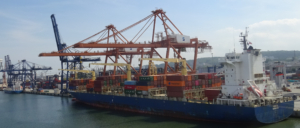Transformation in supply chains.The necessary involvement of shipping and ports

 By Marek Grzybowski
By Marek Grzybowski
It is important for businesses to consider climate risk in the broader context of environmental and social impacts, and in particular the exposure of their supply chains to this risk, warns the United Nations Global Compact in its latest report, Just Transition In Supply Chains.
It should be emphasized, however, that the transformation involves not only production companies but, to a large extent, all elements of chains, or rather complex logistics networks. Operators of fleets, ports and transshipment terminals will play an important role in this process. The globalization of cooperative connections cannot be broken in a short time. We saw this during the pandemic and now after Russia’s attack on Ukraine.
Deglobalization is progressing slowly and without success. The transformation of supply chains is aimed at automation, the introduction of information and space technologies, and the operation of transnational management boards and corporate interests. The last, spectacular example is the turning on and off of the Starlink satellite system over Ukraine according to Elon Musk’s business priorities.
We may encounter disruptions in food supply chains (example of grain from Ukraine), supplies of electronics for the production of cars or communication systems, supplies of energy raw materials or elements for the construction of wind farms, which has recently been noticed by investors. The effects of disruptions or deliberate disorganization of supply chains concern not only technology. They also affect employees and practically entire communities.
Socially responsible corporations
The UN Global Compact therefore states that “enterprises must minimize and address any adverse impacts on workers and communities that result from the implementation of mitigation and adaptation measures by working with suppliers and social partners.”
Many companies undoubtedly still lack knowledge about corporate social responsibility or even reluctance to create an appropriate company culture. This will make it easier to move production outside highly developed countries and consciously turn a blind eye to corporations cooperating with producers from Africa, Asia and South America. According to experts, “Improving the qualifications of suppliers could increase awareness of these threats.” But it is not everything.
The UN Global Compact focuses on the threats caused by climate change. And these largely reinforce the negative impact on supply chains caused by wars, corruption, diversion of income to tax havens and pandemics. Therefore, it is not very revealing to say that “each company must make its own assessment of the value chain and determine the scope of risk it is exposed to due to climate change.”
Risk at key logistics connection points
What is important is that a breakdown at key logistics connection points negatively affects the harmonized operation of each company’s value chain. During the pandemic and the war on the Black Sea, seaports became key links in maintaining the continuity of the supply chain of grain, fertilizers, steel and strategic raw materials.
Shipping companies have done an excellent job of circumventing sanctions and taking advantage of the extraordinary demand for cargo space on bulk carriers, tankers, ro-ro ships and container ships. Therefore, it is necessary to keep in mind the constant development of ports and the adaptation of transhipment terminals to operate in crisis situations.
The UN Global Compact has completed recommendations for business to increase the resilience of enterprises to the effects of global disruptions in supply networks. It is also important that business goals do not overshadow the fulfillment of the social goals of business activity. Conclusions and recommendations are based on the experiences and suggestions of Think Lab participants. The aim of the recommendation is to answer the question: “how a just transformation can help the company obtain additional benefits resulting from the integrated implementation of social and environmental goals.”
Strong brands and best practices
The aim of the Think Lab on Just Transition is to shape socially responsible business and, through reasonable leadership, involve companies in the process of just transition. The idea is to meet key business challenges in dynamically changing environmental conditions; highlight opportunities to promote good practices in global business.
UN Global Compact strives to disseminate knowledge about the best business solutions conducive to the implementation of ECG demands. The database of best practices is created based on the experience of leading entities operating in global logistics for many years.
The companies supporting the initiative include well-known brands, including: A.P. Møller – Mærsk, Accenture, AIA Group, CEMEX, DP World, Enara Capital, Enel SpA, Garanti BBVA, Iberdrola, Johnson Controls, Lenovo Group, LONGi, Mahindra Group, Majid Al Futtaim, Meta, Microsoft, Moody’s Corporation, Australian National Bank , Nestlé, Novozymes A/S, Ørsted, ReNew, Unilever, and some retail chains, banks and financial institutions.
